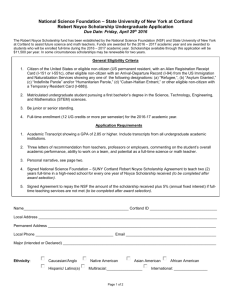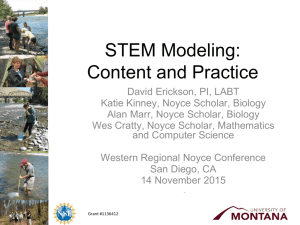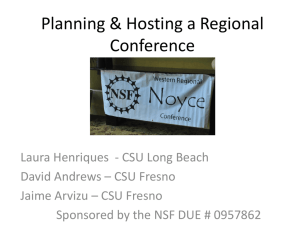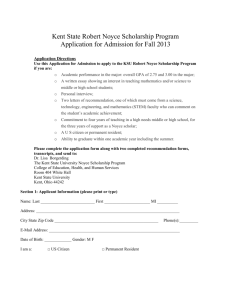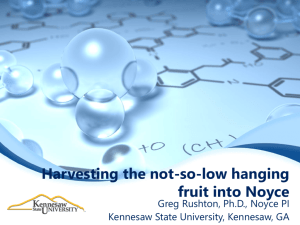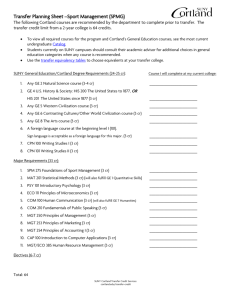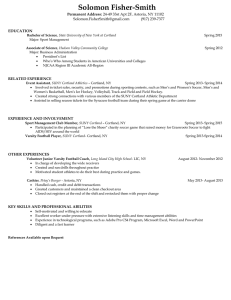AGENDA Thursday, March 20, 2014 March 20-22, 2014 • Philadelphia, PA
advertisement
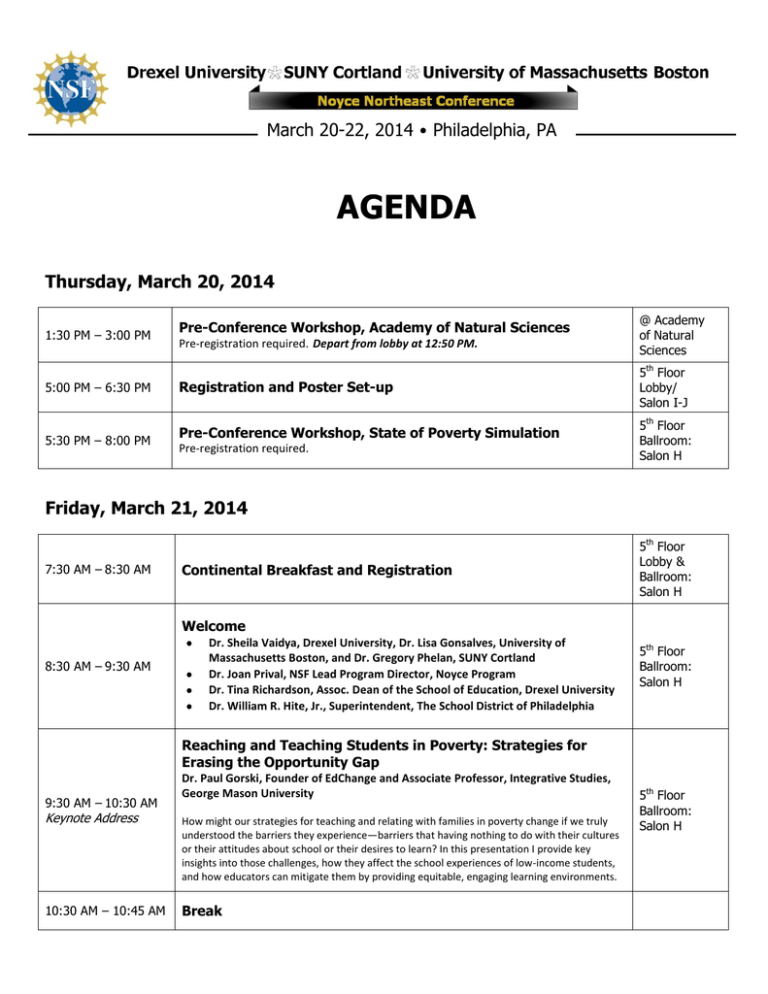
March 20-22, 2014 • Philadelphia, PA AGENDA Thursday, March 20, 2014 1:30 PM – 3:00 PM 5:00 PM – 6:30 PM 5:30 PM – 8:00 PM Pre-Conference Workshop, Academy of Natural Sciences Pre-registration required. Depart from lobby at 12:50 PM. Registration and Poster Set-up Pre-Conference Workshop, State of Poverty Simulation Pre-registration required. @ Academy of Natural Sciences 5th Floor Lobby/ Salon I-J 5th Floor Ballroom: Salon H Friday, March 21, 2014 7:30 AM – 8:30 AM Continental Breakfast and Registration 5th Floor Lobby & Ballroom: Salon H Welcome 8:30 AM – 9:30 AM Dr. Sheila Vaidya, Drexel University, Dr. Lisa Gonsalves, University of Massachusetts Boston, and Dr. Gregory Phelan, SUNY Cortland Dr. Joan Prival, NSF Lead Program Director, Noyce Program Dr. Tina Richardson, Assoc. Dean of the School of Education, Drexel University Dr. William R. Hite, Jr., Superintendent, The School District of Philadelphia 5th Floor Ballroom: Salon H Reaching and Teaching Students in Poverty: Strategies for Erasing the Opportunity Gap 9:30 AM – 10:30 AM Keynote Address 10:30 AM – 10:45 AM Dr. Paul Gorski, Founder of EdChange and Associate Professor, Integrative Studies, George Mason University How might our strategies for teaching and relating with families in poverty change if we truly understood the barriers they experience—barriers that having nothing to do with their cultures or their attitudes about school or their desires to learn? In this presentation I provide key insights into those challenges, how they affect the school experiences of low-income students, and how educators can mitigate them by providing equitable, engaging learning environments. Break 5th Floor Ballroom: Salon H 1) Effectively Using Mobile Technology in the STEM Classroom Chris Widdall, SUNY Cortland From simple writing tasks to the infusion of collecting and presenting student work, mobile technologies can bring the extra edge you have needed to keep today’s 21st century student engaged. Come join this hands-on workshop where you will have the opportunity to see and use apps to supplement a lesson, engage students, design projects, collect data, and use app-in-app tools, while showcasing the power of math and science. The presentation will focus on the OS mobile platform, with infusion of Android and some cross platform apps. Bring Your Own Device (BYOD) if you have one, but there will be several iPads for participants to use. 2) Reflective Listening in Multi-Dimensional STEM Classrooms John Suarez, SUNY Cortland STEM topics can pose challenges for children, parents, and teachers in our increasingly diverse society. In this role-play workshop, participants practice reflective listening as a way of preserving working relationships in classrooms that are divided by politics, economics, religion, or culture. 3) Teaching Math Using Culturally Relevant Teaching Strategies: Going Deeper than Adele’s Vocals 10:45 AM – 11:45 AM Concurrent Sessions Dr. Mary Gfeller, SUNY Cortland, Kelsey O’Donnell & Robin Tobin, SUNY Cortland Noyce Scholars In this session, perspectives on culturally relevant teaching strategies in teaching secondary math concepts will be discussed using examples from real classrooms. Come and explore the various strategies designed to make math more accessible and more meaningful to students! 4) De-Criminalizing High Stakes Exams through Effective Teaching: Using Project-Based Learning Modules to Meet and Exceed Standards Timothy Conner, SUNY Cortland, Brendan Creegan & Eric Reisweber, SUNY Cortland Noyce Scholars Fearing the results of high stakes exams, teachers often resort to “teaching to the test” or trying to force feed standardized curriculum to resistant students. As a teacher in New York, a state with a long history of high stakes, end of the year assessments, I found that project-based modules focused on issues relevant to my students were much more effective than teaching to the test. Project-based learning helps to engage students in relevant science experiences and provides a context to support the learning of content required for success on state exams. In this session, we will demonstrate how project-based modules can be used in the classroom to meet and exceed understandings required for high stakes assessments. 5) Fostering Algebraic Thinking through Non-Routine Problems: A Hands-on Approach Dr. Blidi Stemn, Hofstra University The purpose of this session is to provide participants with a problem-solving approach to developing algebraic thinking skills among secondary school students as they collect and organize data, analyze patterns, and make generalizations. Session Rooms, 3rd/4th/5th Floors 10:45 AM – 11:45 AM Concurrent Sessions 6) Reaching and Teaching Students in Poverty: Strategies for Erasing the Opportunity Gap, Discussion Dr. Paul Gorski, George Mason University & Dr. Anne Burns-Thomas, SUNY Cortland Come to this follow-up session to Dr. Gorski’s keynote address. Participants will have the opportunity to meet Dr. Gorski and discuss topics from his latest book. Come prepared to ask questions and participate in a lively discussion! 11:45 AM – 12:00 PM Session Rooms, 3rd/4th/5th Floors Break Lunch and Keynote: How Learning Works: Seven ResearchBased Principles for Smart Teaching Dr. Michele DiPietro, Executive Director of the Center for Excellence in Teaching and Learning/Associate Professor in the Department of Mathematics and Statistics, Kennesaw State University 12:00 PM – 1:00 PM Keynote Address A tenet of learner-centered teaching is that learning is the litmus test of any pedagogy. Therefore, one of the most important investments teachers can make is to understand the learning process so that their teaching is intentionally learning-oriented. In this talk we will synthesize 50 years of research on learning from the cognitive, metacognitive, motivational, developmental, and inclusiveness perspectives into seven integrated principles. This interactive presentation will highlight the principles, demonstrate them for the audience, and suggest implications for teaching. 5th Floor Ballroom: Salon H 1) Effectively Using Mobile Technology in the STEM Classroom Chris Widdall, SUNY Cortland 1:00 PM – 2:00 PM REPEAT SESSION From simple writing tasks to the infusion of collecting and presenting student work, mobile technologies can bring the extra edge you have needed to keep today’s 21st century student engaged. Come join this hands-on workshop where you will have the opportunity to see and use apps to supplement a lesson, engage students, design projects, collect data, and use app-in-app tools, while showcasing the power of math and science. The presentation will focus on the OS mobile platform, with infusion of Android and some cross platform apps. Bring Your Own Device (BYOD) if you have one, but there will be several iPads for participants to use. Concurrent Sessions 2) Habitat Ecology Learning Program Colleen Owen, Coordinator of Professional Development for Educators/Urban Advantage Liaison at the Wildlife Conservation Society @ Bronx Zoo & Fordham University Noyce Scholar Discover the amazing adaptations of Temperate Forest flora with HELP! The Habitat Ecology Learning Program (HELP) is a hands-on program that will allow you to explore some of the defining characteristics of habitats as well as how plants, animals, and indigenous people have adapted to survive in these diverse conditions. HELP is a great way to encourage your students to explore the richness of ecology, both in the classroom, and in a local park, nature center, or zoo! Session Rooms, 3rd/4th/5th Floors 3) Math and Sustainability Dr. Victor Donnay, Bryn Mawr College In this hands-on workshop, we will explore ways to make connections in our classrooms between math topics and issues of sustainability. Examples will include analyzing energy use from light bulbs and other appliances, calculating energy produced by solar panels, modeling CO_2 levels in the atmosphere and the extent of Arctic ice sheets. We will also examine ways to have students use their academic knowledge to carry out hands-on projects to green their schools and communities. These examples are drawn from materials developed for Mathematics Awareness Month (MAM) 2013 – the Mathematics of Sustainability (www.mathaware.org). The presenter, Victor Donnay, was Chair of the MAM Organizing Committee and has also run summer workshops for teachers on this topic. 1:00 PM – 2:00 PM Concurrent Sessions 4) Using Stories to Teach Science Dr. Angela Pagano, SUNY Cortland, Brendan Creegan & Eric Reisweber, SUNY Cortland Noyce Scholars Placing scientific information into a relevant context is important for student engagement and deeper understanding of scientific content. For example, the framework for the Next Generation Science Standards suggests the use of history of science stories or cases as an important approach for providing the context for developing students’ understanding of the nature of science. In this session, we will provide an overview of the importance of communicating science, work though a selection of activities, and provide examples of stories that can be incorporated into the secondary science curriculum. Resources for obtaining additional information on this topic will be provided. 5) The Journey to Recruit Future STEM Educators: The First Step Dr. Trina Crowley, Dr. Armand Desmarais, & Kym Welty, University of Massachusetts Dartmouth, & Lauren O’Brien & Charlotte O'Driscoll, University of Massachusetts, Dartmouth Noyce Scholars This hands-on workshop will assist Noyce Principal Investigators, staff and faculty in preparing an intensive one week summer institute designed to recruit STEM majors who may be interested in teaching with a candid analysis of contemporary teaching. Participants will assume the role of potential STEM teachers and experience a condensed version of the “Teaching as a STEM Profession” Summer Institute. Topics will include: Delivering & Assessing the Journey, Planning & Recruiting for the Journey, and Follow-up Strategies. Last summer (2013), Center for University and School Partnerships (CUSP) at the University of Massachusetts Dartmouth conducted a successful institute entitled “Teaching as a STEM Profession.” All aspects of the institute will be shared with individuals who are interested in developing this exciting initiative. 6) How Learning Works, Post Keynote Discussion Dr. Michele DiPietro, Kennesaw State University Come to this follow-up session to Dr. DiPietro’s keynote address. Participants will have the opportunity to meet Dr. DiPietro, discuss topics from his book, and to ask questions. 2:00 PM – 2:15 PM Break Session Rooms, 3rd/4th/5th Floors The Myth of Ability: Nurturing Mathematical Talent in Every Student Dr. John Mighton, Founder of JUMP Math 2:15 PM – 3:15 PM Keynote Address 3:15 PM – 4:30 PM Could our society be harmed, in more ways than one, because we do not teach children according to their true potential in mathematics? I will present evidence from psychological and educational research, as well as evidence gathered by the JUMP Math program, that ability in math can be nurtured in even the “weakest” students. I will examine which of the approaches to teaching mathematics presently used in our schools are working and which, in my opinion, need to be reevaluated or modified. In particular, I will present new research from cognitive science that shows how the best aspects of discovery-based learning can be combined with more rigorously guided instruction. Noyce Scholarship Poster Session/Coffee Break 3:30 PM – 4:00 PM (odd numbered) 4:00 PM – 4:30 PM (even numbered) 5th Floor Ballroom: Salon H 5th Floor Ballroom Salon I-J Networking for Excellent STEM Teaching in High‐Need Schools Project Administration: Roundtable Discussion Project Administrators are invited to attend this roundtable discussion. This is an excellent opportunity to meet your fellow Noyce PIs and project personnel and discuss topics relevant to the NSF Robert Noyce Scholarship Program. Teaching STEM in New York City Leslie Banks, Office of Teacher Recruitment & Quality, NYC Department of Education 4:30 PM – 5:30 PM Noyce Scholars are welcome to attend this session with the NYC Department of Education. A general overview of working in New York City will be provided, including opportunities, leadership pathways, and innovative programs. Join us to ask questions and discuss opportunities in NYC! Jump Math, Post Keynote Discussion Dr. John Mighton Come to this follow-up session to Dr. Mighton’s keynote address. Participants will have the opportunity to meet John Mighton, ask questions, and discuss JUMP Math in more detail. 5:30 PM – Dinner on Your Own Session Rooms, 4th& 5th Floors Saturday, March 22, 2014 Continental Breakfast Collaborate! Breakfast today will offer Noyce Scholars and Project Personnel the opportunity to get to know one another by region. Please find the table with the sign indicating the state in which your project is located. The signs are also color-coded by region: 7:30 AM – 8:45 AM Blue New York Red Connecticut Massachusetts Rhode Island Yellow Maine New Hampshire Vermont Green Delaware Maryland New Jersey Pennsylvania 5th Floor Ballroom: Salon H “Donning Spandex” Ryan Devlin, Brockway High School and 2013 Pennsylvania Teacher of the Year 8:45 AM – 9:30 AM Educators have numerous responsibilities and wear multiple hats, but it only takes five words to describe their profession—“selflessly dedicated to others’ success.” The result of exemplary teaching is never cash bonuses or Kardashian-like fame, but Devlin believes there is no nobler a profession. That is why educators must change into spandex suits and soar into their classrooms with a sense of urgency and determination to teach like the world depends on it. Get ready to zip up and go. 9:30 AM – 9:45 AM Break Keynote Address 5th Floor Ballroom: Salon H 1) Turning Anxiety into Inspiration: Teaching in an Urban School District Stephanie Jerome and Brian Pavlovic, School District of Philadelphia In this interactive session, student achievement data will be shared with a view to discussing the opportunities and challenges of teaching in Philadelphia. Participants will be encouraged to share their own unique teaching experiences. 9:45 AM – 10:45 AM Concurrent Sessions 2) Engaging in Mathematical Tasks that Foster Reasoning and SenseMaking Dr. Tyrone Washington, Millersville University The presenter will outline habits that foster reasoning and sense-making. Attendees will engage in mathematical tasks designed by Noyce scholars as part of an action research cycle. The presenter will lead a discussion regarding the manner in which attendees applied reasoning and sense-making while completing the tasks. Session Rooms, 3rd/4th/5th Floors 3) Promoting Academic Language in Science Classrooms Dr. John Craven, Fordham University Strategies for addressing the Common Core language demands (Analyzing, Explaining, Interpreting and Justifying with Evidence) are shared with teachers from upper elementary-high school. Participants will engage in activities designed to support students’ abilities to evaluate and generate evidence-based arguments. 4) Turbocharged Teaching with Technology Ryan Devlin, Brockway High School and 2013 Pennsylvania Teacher of the Year This workshop will highlight a multitude of free educational resources and tools on the internet. The resources and tools being presented can help you turbocharge your teaching or serve as an assessment tool for project-based learning, thus accelerating students’ creativity, critical thinking, communication, and collaboration skills. 5) Clinical Richness: Master Teachers in STEM Methods Courses Dr. Keith Sheppard & Dr. Angela Kelly, Stony Brook University, Keith Millman & Chuck Vessalico, Stony Brook University Noyce Master Teachers 9:45 AM – 10:45 AM Concurrent Sessions This session describes how several master teachers (Noyce Fellows) have been integrated into the pre-service STEM Education program at Stony Brook University as part of our Noyce I and Noyce II grants. The session includes an overview of the curriculum of the methods classes, the rationale for the inclusion of master teachers and the impact of their inclusion on our pre-service teachers. Two of our current Noyce master teachers will provide their perspective on the efficacy and challenges involved. The session will include a section on the newly established New York State STEM Master Teachers Program. 6) Thinking Outside the Classroom: How Service Learning Prepares Future Teachers to Tutor, Mentor and Support Informal and Formal Science and Math Education Dr. Douglas Baird and Herbert Green, Temple University, Jennifer Berman, Temple University TUteach, & Calvin Wang, Temple University TUteach & Noyce Scholar An excellent teacher goes beyond the classroom: they tutor students after school, mentor students about nonacademic issues, and support students with their extracurricular activities. Despite the importance of engaging in such activities, teachers are rarely provided with the training needed to effectively take on these important tasks that benefit students. Service learning is one way that future teachers can gain training and experience in some of the tasks they will take on outside of the classroom. By engaging with communities via service learning, future teachers may be encouraged to remain teachers and continue serving in the communities where they had volunteered earlier. Come to this session to learn more about our new service learning course, “Community Engagement: Science and Mathematics Tutoring, Mentoring and Service” and its potential impacts. 10:45 AM – 11:15 AM Coffee Break Session Rooms, 3rd/4th/5th Floors Voices from the Field Facilitator: Beth White, University of Vermont 11:15 AM – 12:00 PM Plenary Session 12:00 PM 1:30 PM – 3:00 PM Participants: Sam Bromley: Integrated Science & Chemistry Teacher at Montpelier High School, Montpelier, VT. University of Vermont Noyce Scholar; Michael Franklin: Math and Science Teacher at Chester A. Arthur School, Philadelphia.PA. Drexel University Noyce Scholar; Amy Gutekunst: Chemistry Teacher at Esperanza High School, Philadelphia, PA. Temple Noyce Scholar; Amanda Katzias: Mathematics teacher at Mastery Charter School, Philadelphia, PA. Drexel University Noyce Scholar; Gauri Kolhatkar: Mathematics teacher at Ithaca High School, Ithaca, NY SUNY Cortland Noyce Scholar; Tom Payeur: Mathematics teacher at Winooski Middle/High School, Winooski, VT University of Vermont Noyce Scholar. Closing Remarks Dr. Sheila Vaidya, Drexel University Academy of Natural Sciences Workshop Pre-registration required. Depart from lobby at 1:00 PM. 5th Floor Ballroom: Salon H 5th Floor Ballroom: Salon H @ Academy of Natural Sciences
